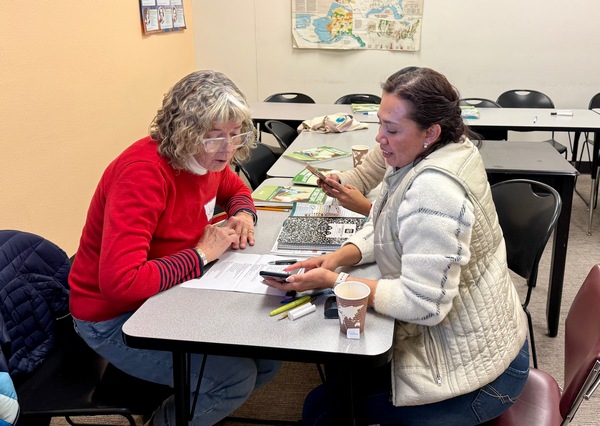By Rachel Fuchs, Intercambio Director of Product Sales and National Network
Originally published March 24, 2025 | Updated for Literacy Texas
At Intercambio, Connection Drives Everything We Do
Based in Colorado, Intercambio is a national nonprofit that builds meaningful connections and stronger communities through English education. All our programming stems from the belief that shared learning experiences and authentic relationships break down barriers, build confidence, and foster inclusion. While our day-to-day focus is often on supporting one-on-one connections between our 500+ local English learners and their teachers, our national team is focused on expanding that same spirit of connection at the organizational level – ultimately reaching tens of thousands more.

Launching the Intercambio Network
That vision became the foundation of the Intercambio Network. Since 2020, more than 160 organizations have participated in the Network’s growing number of opportunities to connect, share, and grow together. Membership is offered at two levels – Family and Friend – and both provide valuable access to professional development and peer support.
Family members, for example, receive the same comprehensive online teacher training that Intercambio volunteers use to prepare for teaching with our Confidence and Connections curriculum. These workshops not only provide practical tools but also a sense of belonging – more than 1,800 individuals have participated so far, and each cohort is invited into an online community where members can introduce themselves, ask questions, and find support.
“We have really benefited from our membership. It has helped us create more structure in our program and we have received positive feedback from both volunteers and students.”
Andrea De Jong, Permian Basin Adult Literacy Center in Midland, TX

Supporting Educators and Program Leaders Nationwide
In addition to teacher training, the Intercambio Network offers ongoing learning and connection throughout the year. Monthly virtual connection hours, teaching workshops, and an annual online summer conference bring educators together to share practices and stay energized. Last year’s conference welcomed over 270 participants from across the country.
For program administrators, we host structured Networking Calls three times a year. These themed calls create space for leaders to connect, ask questions, and collaborate on common challenges. Past conversations have explored topics like measuring program impact, weaving equity into decision-making, and introducing group classes into historically one-on-one models. Again and again, we see how valuable it is for practitioners to know they’re not alone – and to learn from each other in real time.
Connection as a Core Strategy
I’ve often mused that Intercambio is in the business of connection through mutual learning and relationship-building. We could choose to do that in many different ways; we just happen to do that through English acquisition. And as the Intercambio Network continues to grow in strength, it’s clearer than ever that connection is at the core of what we do there, too.
To learn more about the Intercambio Network and how your program can get involved, visit intercambio.org/network.
You can find Intercambio Uniting Communities among the exhibitors at the 2025 Literacy Texas Annual Conference.
Get Texas literacy updates
Join our mailing list so you don’t miss any news:
- Local and national literacy news
- Conference updates
- Regional symposia
- Best of Texas
- Advocacy
- …more!







